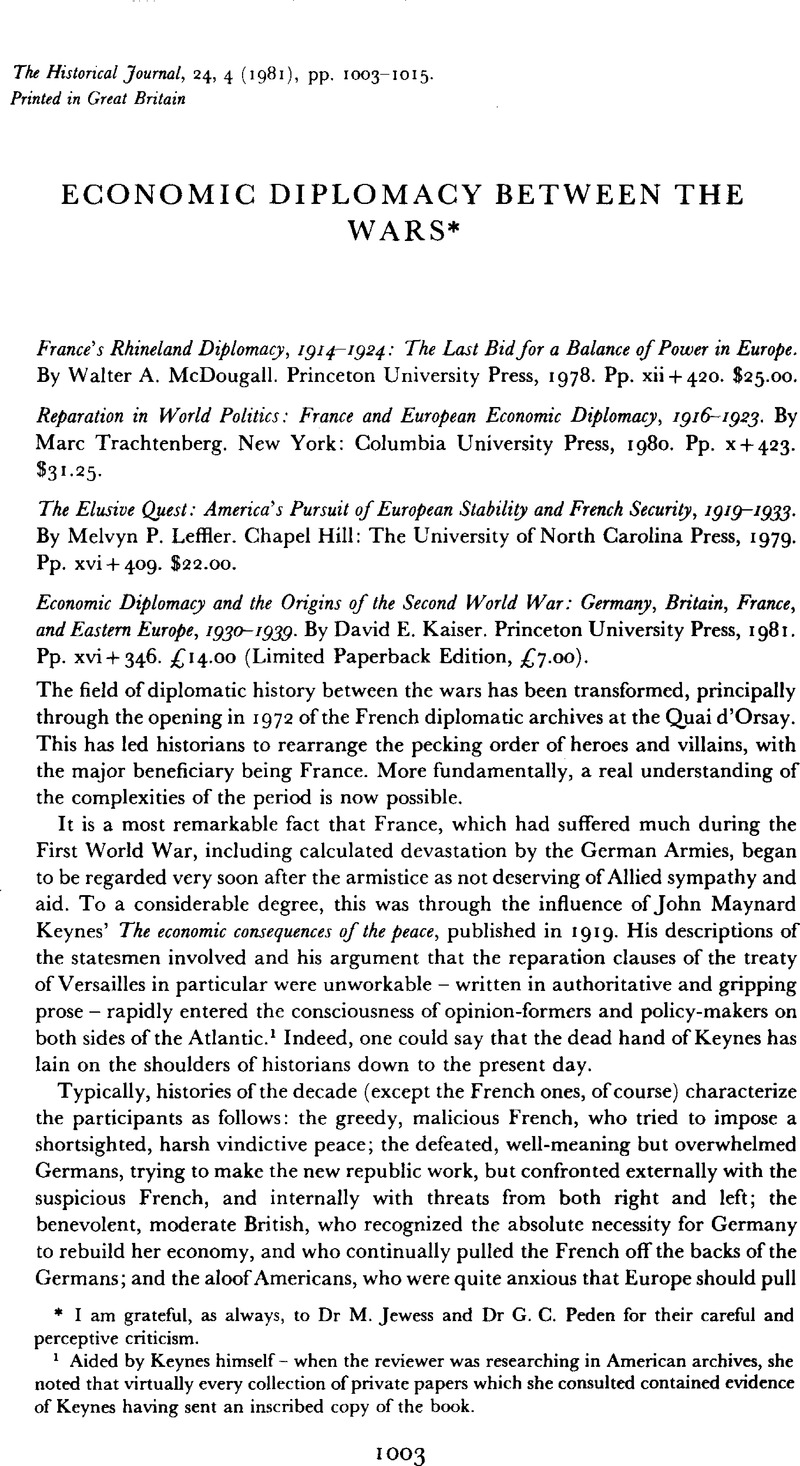Article contents
Economic Diplomacy Between the Wars *
Published online by Cambridge University Press: 11 February 2009
Abstract

- Type
- Review Article
- Information
- Copyright
- Copyright © Cambridge University Press 1981
References
1 Aided by Keynes himself – when the reviewer was researching in American archives, she noted that virtually every collection of private papers which she consulted contained evidence of Keynes having sent an inscribed copy of the book.
2 There have been several other outstanding books published recently which deserve to be consulted by those interested in the field: Maier, Charles S., Recasting bourgeois Europe: stabilization in France, Germany and Italy in the decade after World War I (Princeton, 1975)Google Scholar; Schuker, Stephen A., The end of French predominance in Europe: the financial crisis of 1924 and the adoption of the Dawes Plan (Chapel Hill, 1976)Google Scholar; Bariety, Jacques, Les relations franco-allemandes aprés la premiére guerre mondiale (Paris, 1977); and Denise Artaud, ‘La question des dettes interalliées et la reconstruction de l’Europe (1917 1929)’, 2 vols. (Lille: Atelier Réproduction des théses, Université de Lille, III, 1978).Google Scholar
3 For the problem of reparations, see the books listed in footnote 2, as well as the following articles: Rhodes, Benjamin D., ‘Reassessing “Uncle Shylock”: the United States and the French war debt, 1917–1929’, Journal of American History, LV, no. 4 (March 1969), 787–803CrossRefGoogle Scholar; Marks, Sally, ’ Reparations reconsidered: a reminder’, Central European History, 11 (1969), 356–65Google Scholar; Artaud, Denise,’A propos de l’occupation de la Ruhr’, Revue d’Histoire Modeme et Contemporaine, XVII (March 1970), 1–21Google Scholar; Felix, David, ‘Reparations reconsidered with a vengeance’, Central European History, iv (June 1971), 171—9CrossRefGoogle Scholar; Artaud, Denise, ‘Le gouvernment américain et la question des dettes de guerre au lendemain de l’Armistice de Rethondes (1919–1920)’. Revue d’Histoire Moderne et Contemporaine, xv (June 1973), 201–29CrossRefGoogle Scholar; and Bariéty, Jacques, ‘Les réparations allemandes après la première guerre mondiale: objet ou pretexte à une politique rhénane de la France?’, Bulletin de la Sociélé d’Histoire Modeme, LXXII (May 1973), 21–33.Google Scholar
4 See the article by Bariéty, Ibid.
5 See footnote 2.
6 The question of corporatism informs the structure of Maier, Recasting bourgeois Europe. The corporatist model derives more from central European than from Anglo-Saxon political practices, and discussions of state versus societal corporatism have long formed a theme of German historiography. Dr Werner Abelshauser of Ruhr-Universität Bochum has been working on the theme of corporatism in Germany from Bismarckian Germany to the Federal Republic, of which the first result in English is a paper entitled ‘The first post liberal nation: traditional and modern elements in German capitalism’. For Germany during the early post-war period see the magisterial book by Feldman, Gerald, Iron and steel in the German inflation 1916–1923. (Princeton, 1977)Google Scholar. The theme has attracted few scholars working on Britain. Samuel Beer considers it in Modern British politics: a Study of parties and pressure groups(London, 1965)Google Scholar; Keith Middlemas uses ‘ corporate bias’ as the organizing principle of his Politics in industrial society: the experience of the British system since 1911(London, 1979), a book which apparently had a better reception in Germany than in Britain.Google Scholar
7 Trachtenberg’s argument is generally supported by Maier, Charles in ‘The truth about the treaties’, Journal of Modem History, LI, no. 1 (March 1979), 56–67. Maier agrees that while the historical question is difficult to solve on a theoretical basis, in the end it was not so much an economic problem as a political one.CrossRefGoogle Scholar
8 Bennett, Edward W., in German rearmament and the West, 1932–1933(Princeton, 1979),Google Scholar discusses the same episode. He considers that ‘Baldwin appears merely to have been throwing out some ideas’ to two American officials (p. 157), and that he was ‘ rather astonished’ to have them taken seriously, later insisting that only personal ideas had been expressed (Ibid., note 50). Bennett used British as well as American material to disentangle the episode.
9 See also the books by Parrini, Carl P., Heir to Empire: United Stales economic diplomacy, 1916–1923(Pittsburg, 1969)Google Scholar; Wilson, Joan Hoff, American business and foreign policy 1920–1933(Lexington, 1971)Google Scholar; and Hogan, Michael J.Informal entente: the private structure of cooperation in Anglo-American economic diplomacy, 1918–1928(Colombia, 1977)Google Scholar. The following series of articles by Frank Costigliola is also useful: ‘The other side of isolationism: the establishment of the First World Bank, 1929–1930’, Journal of American History, LIX, no. 3 (Dec. 1972), 602–20Google Scholar; ‘The United States and the reconstruction of Germany in the 1920s’, Business History Review, L, no. 4 (Winter 1976), 477–502Google Scholar; ‘Anglo-American financial rivalry in the 1920s’, Journal of Economic History, xxxvii, no. 4 (Dec. 1977), 911–34Google Scholar; and ‘American foreign policy in the “Nut Cracker”: the United States and Poland in the 1920s’, Pacific Historical Review, XLIX, no. 1 (Feb. 1979). 85–105.Google Scholar
10 Jacobson, Jon, Locarno diplomacy: Germany and the West 1925–1929(Princeton, 1972).Google Scholar
11 For an argument for the continuity of British interest in Eastern Europe see Newman, Michael, ‘The origins of Munich: British policy in Danubian Europe, 1933—1937’, Historical Journal, xxi (June 1978), 371–86CrossRefGoogle Scholar. I am indebted to Martin Ceadel for bringing this article to my notice. See also Newman, Simon, March 1939: the British guarantee to Poland. A study in the continuity of British foreign policy(Oxford, 1976); as might be expected, Kaiser spars with Simon Newman in his footnotes.Google Scholar
12 But see Jürgen Wendt, Berndt, Economic appeasement. Handel und Finani in der britischen Deutschland Politik 1933–1939(Düsseldorf, 1971).Google Scholar
13 Quoted in C. A. MacDonald, ‘Economic appeasement and the German “moderates” 1937–1939. An introductory essay’, Past and Present, no. 56 (Aug. 1972), p. 129.
- 3
- Cited by


